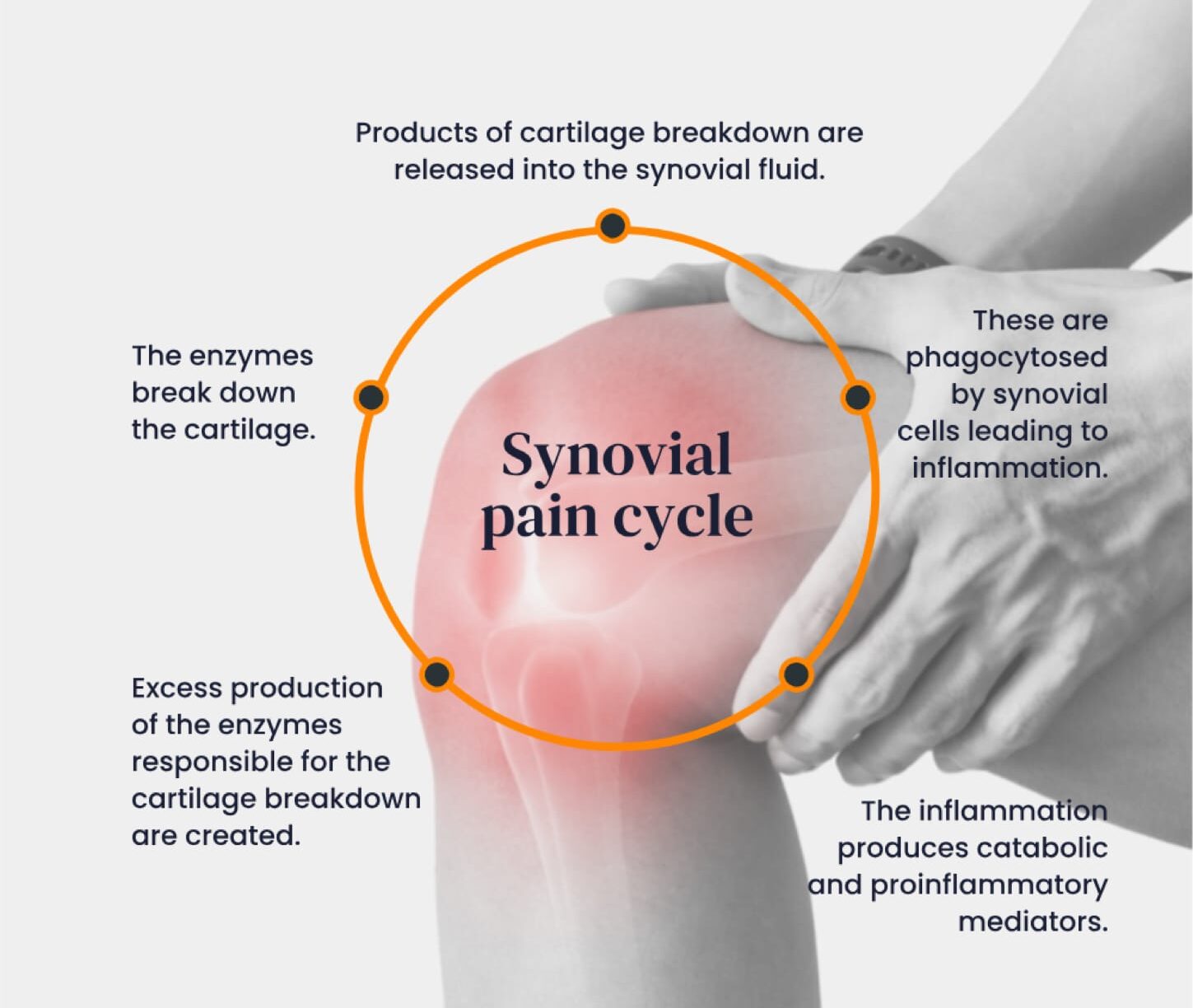Arthrosamid® Injections
Our one-stop shop ultrasound guided injection clinic making access to pain relieving injections as easy as possible for patients whilst offering the highest levels of expertise and patient care.
Introduction
Arthrosamid® is an advanced injectable gel treatment designed to provide long-lasting relief from knee pain caused by osteoarthritis. Many patients report significant improvements, with research showing that benefits can last for several years. The treatment has an excellent safety profile, and while a small number of people may experience some side effects, these are uncommon. This page is here to give you the essential information you need so you can feel confident and well-prepared for your treatment.
We ask all patients to provide written consent prior to booking an injection to ensure they have read and understood the information provided.
Whilst we do not require your doctor to refer you for an injection – we will supply you with a report after the procedure which we suggest you forward to your GP or consultant for your medical records.

Arthrosamid® is a hydrogel injection used to treat knee osteoarthritis. It is licensed as a medical device (similar to hyaluronic acid injections), not as a drug. Unlike other injections, Arthrosamid® does not degrade over time, so it can provide longer-lasting relief.
Arthrosamid® works by binding to the synovium, the lining of the joint that produces synovial fluid. In osteoarthritis, the synovium can become inflamed and overactive, producing excess fluid that leads to swelling and pain. By interacting with the synovium, Arthrosamid® helps to reduce this inflammation and control fluid production, which can relieve pain and improve joint function

How effective is Arthrosamid® for knee osteoarthritis?
Arthrosamid® has been shown to provide a significant and long-lasting reduction in knee osteoarthritis pain. Clinical studies demonstrate that these benefits can be maintained for several years — with some patients still experiencing relief five years after treatment (Bliddal et al., 2024c; Bliddal et al., 2025). However, as with any medical treatment, individual outcomes may vary.
Is Arthrosamid® safe?
Yes. Arthrosamid® is supported by more than two decades of research and has been proven to be both safe and effective in treating knee osteoarthritis (Bliddal et al., 2024a; Bliddal et al., 2024b). As with all medical procedures, there are small risks, which your clinician will discuss with you before treatment.
How do I know if Arthrosamid® is appropriate for me?
Arthrosamid® is suitable for people with osteoarthritis of the knee who are experiencing pain and swelling that may affect daily activities such as walking or running. We generally advise trying non-invasive approaches first, such as rehabilitation/physiotherapy to strengthen the muscles, weight management, knee braces, orthotics, and appropriate footwear, before considering an injection.
We recommend speaking directly with one of our clinical specialists before booking. They may suggest an assessment to ensure your knee is suitable for an Arthrosamid® injection. As part of this process, we usually request that patients have had an X-ray or MRI scan of the knee within the last 12 months.
This video is from Contura Orthopaedics, the manufacturer of Arthrosamid, and is for informational purposes only.
What if I am waiting for a knee replacement?
If you are waiting for a knee replacement, we advise that Arthrosamid® is not given within six months of your surgery. This is because the injection is classed as an implant, and having it within this timeframe may increase the risk of infection or interfere with healing.
What happens when I book to have an Arthrosamid® injection?
Prior to booking an appointment you will be asked to complete our online medical screening and consent form. This will ensure you have been medically screened and have all the appropriate information to make an informed decision about the treatment.
Once this has been screened you will be contacted to discuss any issues identified and and arrange an appointment if appropriate
For more information you can visit the Arthrosamid® website here or download their brochure here.
Do I need to take prophylactic antibiotics before my Arthrosamid® injection?
Prophylactic antibiotics are required prior to Arthrosamid® administration. As Arthrosamid® is classified as an implant, antibiotics help minimise the risk of infection at the time of injection.
One of the following combination of oral antibiotics administered 1-2 hours before Arthrosamid® are recommended:
- For patients without allergy towards penicillin, 1g of Flucloxacillin plus 1g of Azithromycin
OR
- For patients with known or suspected allergy towards penicillin, 600mg of Clindamycin plus 1g of Azithromycin
OR
- 1g of Azithromycin plus 400mg Moxifloxacin
These antibiotics achieve adequate tissue concentrations at the time of injection. Used as a single-dose prophylaxis, they should exert a negligible impact on resistance development. Their spectrum encompasses members of the aerobic and anaerobic (i.e., deep) skin flora, which may contaminate the injection procedure, notably staphylococci, haemolytic streptococci, and Cutibacterium (former Propionibacterium) spp.
Dosages may need to be adjusted in patients with co-morbidities; pharmacist advice should be sought if necessary.
What happens on the day of the injection and how is Arthrosamid® administered?
Before your Arthrosamid® treatment, you will take a dose of antibiotics 1–2 hours before the injection to reduce the risk of infection. When booking, it will be discussed whether you will receive the prescription in advance or take the antibiotics at the clinic on the day. This will depend on a few factors including which clinic the injection will take place, and which clinician is performing the procedure.
On the day of the procedure, the clinician will examine your knee and use diagnostic ultrasound to assess the injection site and check for any excess fluid in the joint. If needed, the clinician may drain (aspirate) this fluid before the injection. This will be discussed with you and carried out on the day at no extra cost.
You will be given a local anaesthetic to numb the area around your knee. The Arthrosamid® injection is then delivered directly into the synovial cavity of the knee, with ultrasound guidance used throughout the procedure to ensure precise placement and to avoid surrounding tissues. Because Arthrosamid® is a thick, honey-like gel, the injection takes several minutes to administer. Once complete, the needle is removed and a plaster is placed over the injection site.
Will it hurt?
Patients receive a local anaesthetic to the area so the pain during the injection is usually quite minor and well controlled. The local anaesthetic is given using a very fine needle so patients should feel only minor pain as this is administered.
What happens after the injection?
Due to the local anaesthetic your pain may be relieved within minutes, but the effect will usually wear off after an hour or two. It usually takes around 4 weeks for the effect of the Arthrosamid® to become apparent. Pain and function will often continue to improve for a further 5 months before full benefits are being experienced.
We recommend you consider your journey home after your injection. This procedure includes the use of local anaesthetic injection around the knee. We recommend patients do not drive home or cycle after this procedure. We always advise that patients try to attend with a friend or relative, if possible.
Patients are advised to avoid strenuous exercise (e.g. running, tennis or long walks) for 10-14 days afterward the injection. Your clinician will advise you on the day of the exact timeframe for your return to activities.
Will I need another injection?
Arthrosamid® is designed to be used only once. Arthrosamid® does not degrade and therefore is designed to provide long term benefits.
Unlike steroid or hyaluronic acid injections, which break down in the body and often need repeating, Arthrosamid® stays in the joint and does not degrade, meaning it can provide long-term benefits. In some cases, if the effects wear off after several years, a repeat injection may be considered. This would be decided on an individual basis, depending on how well you responded to the first treatment.
Potential risks and side effects.
Most people receive Arthrosamid® injections without any side effects. A full list of potential risks and side effects are listed below.
Post injection flare
Some people (around 20–30%) may experience mild pain for a few days after the injection, known as a post-injection flare. This usually settles with rest and simple over-the-counter pain relief. A much smaller number of patients may find the discomfort lasts for several weeks.
Very rarely, a more severe reaction with significant pain and swelling can occur (called pseudo-sepsis). If this happens, a medical review is needed to rule out infection.
Infection
Infection risk is reduced by taking prophylactic antibiotics (as we have discussed earlier in this article). However, very rarely (approximately 1:50,000 injections) you may get an infection in the area of the injection. If the joint becomes more painful, hot and swollen, and/or you are feeling hot, nauseous and unwell you must seek medical attention immediately e.g., go to your local accident and emergency department (A&E). You should inform the medical professional examining you regarding your recent procedure and the details of the prophylactic antibiotics you have taken before the procedure
To reduce the risk of infection, the clinician will carefully clean the area before the injection, wear sterile gloves and place a plaster over it afterwards. It is important to keep the injection site clean and dry until it has healed, which is usually within 24 hours. You may shower or wash during this time, but make sure to keep the area clean and replace the plaster afterwards.
Anaphylaxis
It is extremely rare to have an allergic reaction to Arthrosamid® or local anaesthetic (1:50,000). This would usually happen within the first few minutes of an injection and requires immediate medical attention. Very rarely the allergic reaction can be delayed. The symptoms you might experience are feeling lightheaded or faint, breathing difficulties (such as fast, shallow breathing and/or wheezing), a fast heartbeat, clammy skin, confusion and anxiety, collapsing or losing consciousness.
Below is a summary of the risks/side effects from having Arthrosamid® injection:
- Serious side effects are rare but can include:
- Joint and soft tissue infections.
- Anaphylaxis (allergic reaction) – to antibiotics, local anaesthetic or Arthrosamid® hydrogel injection
- Very rarely severe pain and swelling (known as pseudo-sepsis) which requires medical assessment.
Other potential side effects include:
- Non-efficacy (the treatment may not work)
- Short lived efficacy (the treatment may work for a limited time)
- Post injection flare – usually mild and settles within a few days. Occasionally more severe and can last for several weeks.
- Swelling of Baker’s cyst may occur
- Long term worsening of symptoms
- Bleeding or bruising
Potential side effects of local anaesthetics
Serious side effects are rare and include:
- Infection: This can occur if bacteria enter the injection site. We reduce the risk by carefully preparing the area and using a well-practised, effective technique.
- Anaphylaxis: A severe allergic reaction is very uncommon. We minimise the risk by reviewing your medical history for allergies and having emergency treatment available if needed.
Other potential side effects include:
- Light headedness
- Numbness of area injected
- Dizziness, drowsiness
- Blurred or double vision
- Vomiting
- Bradycardia
- Hypotension, cardiac arrest
- Very rarely loss of consciousness, respiratory depression, respiratory or cardiac arrest.
- Allergic or anaphylactic reaction.
- Injury or trauma to neurovascular structures during the injection procedure.
Can I take other medicines along with the Arthrosamid®?
Yes, you can take other medications alongside having the Arthrosamid® injection. There are no known significant drug interactions that occur with Arthrosamid®. However, if you are taking a blood- thinning drug, such as Warfarin, you may need a blood test to make sure that your blood is not too thin to have the injection safely. This is because of the risk of bleeding into the joint at the time of the injection. If you are taking an anti-coagulant you may need to discuss this with your GP or your clinician before having the injection.
Pregnancy and breastfeeding
Unfortunately, we cannot offer Arthrosamid® injections to patients who are pregnant or breastfeeding, as there is currently insufficient research to confirm its safety in these situations.
You will be asked to remain in the clinic for 20 minutes following the injection to allow observation for possible adverse reactions.
If you have any questions regarding the information contained in this leaflet, please call 02074823875 or email injections@complete-physio.co.uk and we will arrange for one of our clinical specialists to speak with you.
Case Studies
Rob Clark
Rob had lived with knee pain for years, managing it with paracetamol and supplements that offered only limited relief.
A scan for what he thought was a groin strain revealed hip arthritis and led him to Dr George Bownes – while discussing hip treatment, Robert mentioned his persistent knee discomfort.
“That’s why I bumped into George,” he said. “I’d long since given up hope that anything could really help.”
George introduced him to Arthrosamid®.
Three months later, he completed several stages of the Tour de France with Ride The Loop – a demanding cycling event.
“My knees weren’t even a factor — my hip hurt, yes, but my knees didn’t,” he said. “I forget I even have knee issues. It’s given me a level of freedom I haven’t felt in years. And that, for me, is worth everything.”
Jon Pile
Jon is an avid athlete, spending most of his weekends doing some form of exercise whether that’s running, cycling or swimming. But last August things all changed for Jon. A fall whilst running kicked off symptoms and significant knee pain. In a matter of months, he went from competing in triathlons to everything from sport to basic household tasks became increasingly difficult.
After his initial assessments it was suggested Arthrosamid® is a good option and Jon opted for this long-lasting pain relief and helping Jon get back to doing the activities he loves.
Describing the procedure itself, Jon said:
“It’s incomparable to an invasive procedure or surgery. It was an easy procedure, taking just 15 minutes and since then I’ve been able to build back fairly quickly, and I have peace of mind that it’s not going to wear off.”
Jon is back to doing what he loves most. Just two days after receiving the treatment Jon was back in the pool, two weeks later he was on the bike, then back to running and skiing. Now Jon is able to move his body freely and get back to exercising pain-free. He has been able to build back his strength and complete months of intensive training to compete in a 50k ultra-marathon.
Katie Gilmour
With four children aged between eight and 13, four horses, two dogs, four cats and eight chickens, it’s fair to say that Katie Gilmour, 49, from The Haven, West Sussex has a busy and active lifestyle. As an accomplished journalist and podcaster who thrives on being busy and physically fit, Katie developed instability in her right knee in 2021 while running with her daughter and their family pony in a Showing class.
Later diagnosed with patella tendinopathy, Katie’s right knee slowly began to unravel and become more unstable. A subsequent accident in early 2024 that involved a patella dislocation led to surgery later that year. Despite the surgery, Katie’s knee was still compromised by a lack of cartilage and the daily pain was wearing and limiting her usual activities.
Following treatment by Dr. George Bownes with Arthrosamid® in January 2025, Katie is now back on full throttle, recovering well and back to her beloved horses, walking the dogs and on the school run.
She said: “Within two weeks, I noticed that my knee was less painful. A couple of weeks later, my limp faded away. At my recent 12-week check-up with Dr Bownes, my pain score has drastically reduced. I am now able to live a life that is almost as active as it was before my injury.”
References :
- Bliddal, H., et al. (2024a). Effectiveness and safety of polyacrylamide hydrogel injection for knee osteoarthritis: results from a 12-month follow up of an open-label study. Journal of Orthopaedic Surgery and Research, 19, 274.
- Bliddal, H., et al. (2024b). Polyacrylamide gel versus hyaluronic acid for the treatment of knee osteoarthritis: a randomised controlled study. Clinical and Experimental Rheumatology, 42(9), 1729–1735.
- Bliddal, H., et al. (2024c). 3 year follow-up from a randomized controlled trial of intra-articular polyacrylamide hydrogel injection in subjects with knee osteoarthritis. Osteoarthritis and Cartilage, 32(6), 770–771.
- Bliddal, H., et al. (2025). A prospective study of polyacrylamide hydrogel injection for knee osteoarthritis: results from 5 years after treatment. Presented at WCO-IOF-ESCEO 2025.

